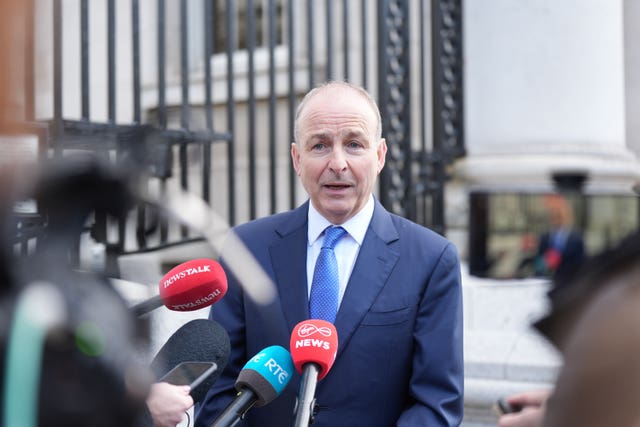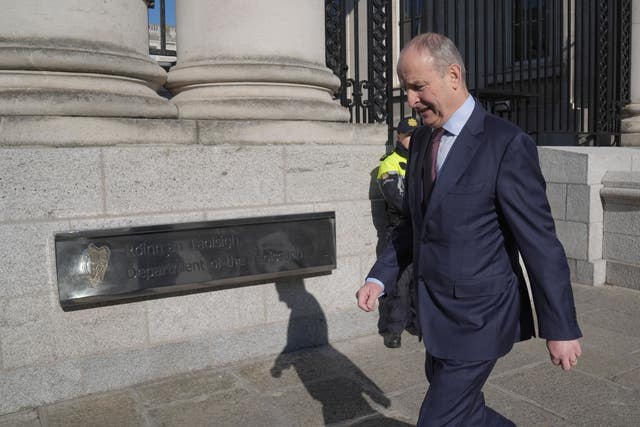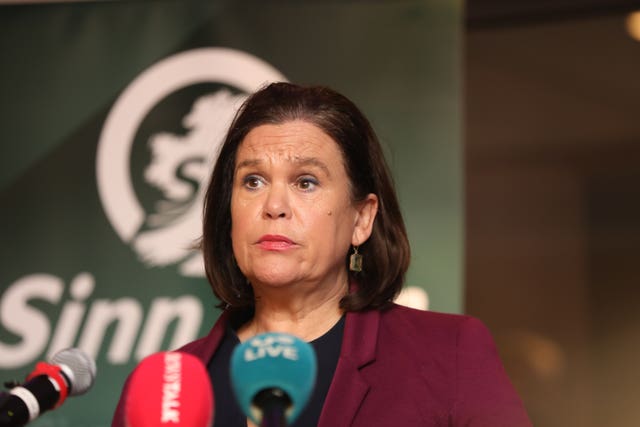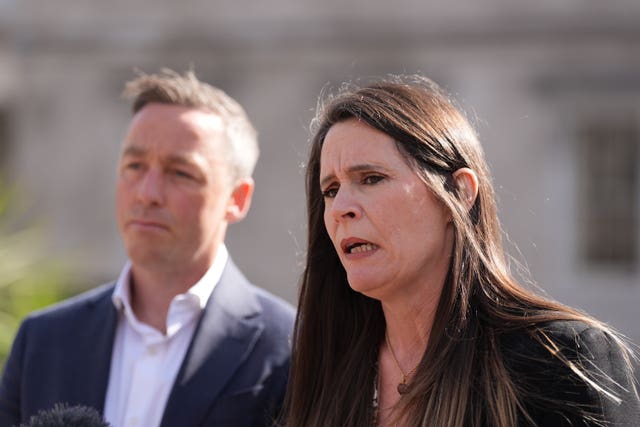Speaker wins confidence vote in divided Irish parliament
The Irish Government has won a vote of confidence in the speaker of the parliament.

The Irish Government has won a vote of confidence in the speaker of the parliament.
The Government brought the motion after opposition parties initially proposed a no confidence motion in Ceann Comhairle Verona Murphy amid a heated row based on speaking rights and the circumstances of the formation of the coalition.
The Government motion expressing that the Dail has confidence in the Ceann Comhairle passed by 96 votes to 71, with two abstentions.
It came after the defeat of an opposition amendment stating that the Ceann Comhairle did not have the confidence of opposition parties.
Speaking afterwards, Ms Murphy said she bears no “ill will” towards the opposition.
In a statement to the Dail, she said: “I wish to assure all members on all sides of this House, I bear no ill will and my door is always open.
“I will continue to uphold my solemn declaration to vindicate the rights of all members and administer the rules chosen by members of this House, impartially and fairly, alongside the independent, loyal and hardworking staff of my office and this House without fear or favour.”
The motion came amid opposition criticism of Ms Murphy’s role in approving a vote last week which allowed the Government to make changes to speaking time in the lower house of the parliament, the Dail.
There were chaotic scenes in the chamber last week over the rule changes which resulted in the suspension of the House and prompted the main opposition parties to express a lack of confidence in Ms Murphy.
Prior to Tuesday’s vote, Irish premier Micheal Martin accused opposition parties of engaging in “cynical strategies of aggression and disruption”.
Mr Martin, the Taoiseach and leader of Fianna Fail, said it was “profoundly regrettable” the vote was being held, adding there was no justification for the motion.

Mr Martin told the opposition on Tuesday afternoon: “We will not stay silent as you try to intimidate this house and its chairperson, and you will not succeed in opposing rule by minority.
“You will not block the democratic business of this house roaring and chanting, and then blaming everyone else for your behaviour.”
Mr Martin said the Dail does do not have time to waste on “cynical strategies of aggression and disruption”, adding that the country is facing “enormous threats” over US tariffs.
He accused accused opposition parties of breaking “every single rule” of the Dail and claimed parties had “manufactured” a claim that Ms Murphy had behaved inappropriately.
The main opposition parties tabled an unprecedented motion of no confidence in Ms Murphy after Government proposals for rule changes sparked a bitter row.
Sinn Fein leader Mary Lou McDonald accused Ms Murphy of showing an “unprecedented and frankly breathtaking display of bias”.
She claimed her position is “untenable”.
Ms McDonald said the Ceann Comhairle made three decisions exposing bias last week; failing to hold a vote on Dail business when one was called; cancelling questions on promised legislation; and failing to put the Government motion to a vote.
The latter allegation is part of Sinn Fein’s contention that the Dail actually voted on the opposition amendment to the motion and thus the rules on speaking rights have not actually been changed.
She said there had been “shameless co-ordination and co-operation between the Ceann Comhairle and the Government”.
“The actions of the Ceann Comhairle have been neither impartial nor independent, quite the opposite.”
The deputy premier Simon Harris called on all parties to “pull together” as the country faces a “potential global trade war”.
“It is my firm conviction that the message of the people from the last election, and the message of people right across Ireland in the last week, is ‘Stop shouting, roaring and hollering at each other, turn up for work and get on with the job’.”

Ms Murphy became the Ceann Comhairle in December in a move seen as among the first steps of an agreement with a group of independent MPs, known as TDs in Ireland, to support the formation of a government with the Fianna Fail and Fine Gael parties.
Backlash to that coalition’s proposals, which would have allowed some of those independent TDs to be directly given opposition speaking time, led to a delay in the nomination of a taoiseach in January.
The Government has since moved to change parliamentary rules to create a new “other members” speaking slot for TDs in that independent bloc who were not given ministerial positions, as well as backbenchers in the Government parties.
The controversial changes to standing orders also include a reduction of time for contributions on debating the order of business and a halving of slots for Taoiseach’s Questions.
The Government said the moves reflect the changing make-up of the Dail.
However, the opposition has vehemently opposed the reforms, characterising them as an attempt to dilute their ability to hold the Government to account and to blur the relationship of the independents who have supported the formation of the coalition.
They argue that the “other members” questions slot does not tally with their position that a TD cannot be in Government and opposition at the same time.
Labour leader Ivana Bacik criticised the changes to the Dail rules as allowing government-affiliated independents to be on “both sides of the fence”.
She suggested that the new Dail speaking slot will be used by backbenchers to “tell the Taoiseach how great he is”.
“We’re going to see it tomorrow, a new Other Members’ Questions slot, a sort of theatrical government TDs parliamentary party meeting in public,” Ms Bacik said.

The deputy leader of the Social Democrats said government is intent on “bulldozing democratic norms to get a grubby deal with a corrupt politician over the line”.
Ciann O’Callaghan said Government politicians “clearly prefer to forget” the findings of the Moriarty Tribunal, which said former Fine Gael minister Michael Lowry had behaved in a manner that was “profoundly corrupt”.
Now an independent TD, Mr Lowry acted as a negotiator for other independents to support the formation of a Government with Fine Gael and Fianna Fail.
Mr O’Callaghan said: “Last Tuesday, as the Dail descended into chaos, one person sat there smiling and laughing.
“Michael Lowry was triumphant, and why wouldn’t he be? He got exactly what he wanted.
“He got one of his group elected as Ceann Comhairle. He got another four appointed as junior ministers, including two super juniors.
“He secured the opposition leader speaking rights and he got influence over how public money in the national development plan and the HSE capital plan will be allocated.
“All of this for a politician who was found what Moriarty tribunal to be, and I quote, ‘profoundly corrupt to a degree that no was nothing short of breathtaking’.”

The row over speaking time has hindered legislative work and has prevented parliamentary committees from being established.
They have disputed whether Ms Murphy carried out her duties correctly and followed proper procedures in carrying out the vote to implement the changes, which were backed by the Government’s majority.
There is some uncertainty as to whether the vote will settle the long-running dispute on opposition speaking rights, which has seen breaks in parliamentary norms of procedure and decorum.
Opposition parties have further argued that the process in which the changes were approved last week was itself flawed.
Sinn Fein, the Social Democrats, and People Before Profit said they would discuss with other opposition parties how they would respond after the vote.





